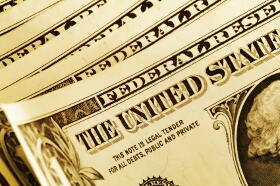The US dollar is surging at the end of the holiday-shortened trading week, buoyed by a stellar June jobs report that defied market expectations and showcased employment gains in nearly every sector of the economy. But equities kicked off the trading session in the red because job creation dampened hopes of a cut to interest rates by the US central bank.
According to the Bureau of Labor Statistics (BLS), the US economy added 224,000 new jobs last month, up from a disappointing 74,000 in May. Forecasts by analysts and economists had suggested the market anticipated a gain of 170,000 jobs.
Jobs numbers for April and May were revised downwards by 11,000.
The unemployment rose from 3.6% to 3.7%, which is still at a near 50-year low. The minor increase was driven by 300,000 people entering the labor market and looking for work.
In June, the average wages paid to American workers climbed by six cents, or 0.2%, to $27.90 per hour. However, the 12-month rate of hourly wage gains was flat at 3.1%. Average weekly hours remained unchanged at 34.4 hours, lower than the median estimate of 34.5 hours.
Job creation was found across the economy, led by education and health services (61,000), professional and business services (51,000), government (33,000), transportation and warehousing (23,900), construction (21,000), and manufacturing (17,000). The only sectors to report declines were retail (5,800) and mining/logging (1,000).
In total, the US economy is averaging 172,000 new jobs every month in the first half of 2019, which is down from the 223,000 clip a year ago.
With the labor market the strongest it has been in decades and the US economy growing for 121 consecutive months, it has given investors consternation that the Federal Reserve will not cut interest rates at this monthâs Federal Open Market Committee (FOMC). The market had penciled in a July rate cut after the Eccles Building suggested that it was turning dovish and preparing to reduce rates to support economic growth.
This bearish sentiment sent leading stock indexes into red territory in the early part of the trading session.
That said, the CME Group Fed Watch tool does still show a 93% chance of a rate 25-basis-point cut from the current target range of 2.25% to 2.50%.
The US Dollar Index is rallying, jumping 0.53% to 97.28 and recording a weekly gain of about 1.2%. Year-to-date, the greenback is up 1.15%.
The USD/CAD currency pair rose 0.46% to 1.3116, from an opening of 1.3049, at 13:49 GMT on Friday. The EUR/USD tumbled 0.59% to 1.1217, from an opening of 1.1285.
If you have any questions, comments, or opinions regarding the US Dollar, feel free to post them using the commentary form below.
US Dollar Surges on Strong June Jobs Report
